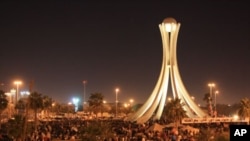Anti-government demonstrators in Bahrain have set up camp at a symbolic site in the capital, Manama, where violent clashes with security forces left a number of people dead over the past week. The military seized control of the Pearl Roundabout on Thursday, but pulled out two days later after escalating tensions within the Gulf nation and growing criticism from abroad.
Protesters began converging on the Pearl Roundabout from all directions shortly after the military’s retreat on Saturday. Witnesses say police fired rubber bullets at the advancing crowd, but eventually stopped and left the scene.
A small number of people were rushed to the hospital.
The government later announced that the protesters would be allowed to stay at the site and reiterated a call for dialogue with all political parties.
By nightfall, demonstrators at the Roundabout sang songs, burned candles and displayed banners calling for peace.
But as the crowd grew quieter in the early hours of Sunday morning, noise from a helicopter circling above could be more easily heard and demonstrators said it served as a reminder that their fight for a new government and more equality is far from over.
One of them, Ali al-Khabbaz, said it would be foolish for protesters to claim a premature victory. He said he believes the government has only temporarily changed its rhetoric to please the international community.
"The Middle East is absolutely changing, so they (government) are in circumstances to do some things just to avoid (the situation). It’s nothing for change; we don’t believe them at all. And we are not, in this day, ready to listen. We need to see change."
Protests inspired by the recent uprisings in Tunisia and Egypt began in Bahrain on February 14th.
Originally, demonstrators were calling for greater equality, more rights and for the release of political prisoners. But after two bloody confrontations at the Pearl Roundabout, the protesters changed their focus to demands for a new government.
Ali Abdullah, who was camping at the site on Sunday morning, said most people believe their demands will eventually be met.
"The protests now from the 14th of February are different. Before, a lot of people were afraid to say we do not want our government, but now after killing lots of people, no one is afraid, no one is staying home."
An increasing number of Bahrain's Sunni Muslims have also begun to take part in the protests.
The majority of demonstrators have been Shi’ites, who represent around two-thirds of Bahrain’s population and say they are not given the same rights as the country’s ruling Sunni minority.
But according to Manama resident Ali Mohammed, people from all sectors of society are condemning the government’s use of violence.
"People say Sunnis don’t support this protest. I’m a Sunni and I am here. My family is here, we are not scared, almost all my friends are here, we are not scared, we are all supporting."
Bahrain is one of several Arab countries to witness political unrest since pro-democracy demonstrations led to regime changes in Tunisia and Egypt.
Bahrain Protesters Set Up Camp at Site of Bloody Clashes




